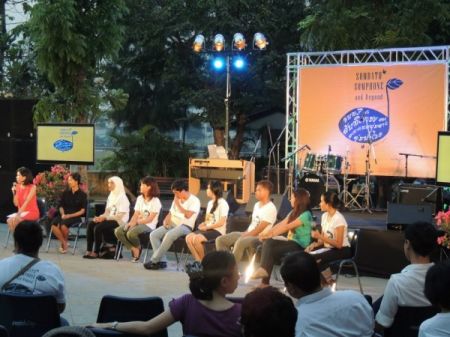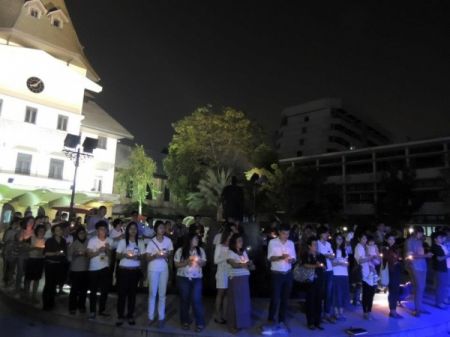Jian You shares his experience on an exchange programme between the Malaysian Centre for Constitutionalism and Human Rights (MCCHR) and the Human Rights Lawyers Association (HRLA) which he found intriguing and fascinating.
Our first day was filled with excitement and adventure courtesy of Haziqah’s well-organised plans. We ventured into the many valleys of delicious foods and to the dark alleys of local pubs. It was surely a hilarious and mind-blowing walking trip.
On a more serious note, my time there has no doubt broadened my horizons on human rights issues in Malaysia and Thailand. Both countries have a lot in common in terms of these – including rigid constraints on basic rights to liberty, free speech and assembly, lack of general awareness on past and current human rights issues in institutions of higher education, constant criticisms and false accusations levied by the powers that be – notably the government and its utilisation of the Internal Security Act 1960 and other oppressive laws aimed at restricting the growth of democracy.
Both countries, however, simultaneously possess its own localised human rights issues; in Thailand for example, enforced disappearances happen very often, especially in the southern region. Thus far in Malaysia, this is unprecedented. On the other hand, stringent rules and regulations to curb active student participation in higher learning institutions are uncommon in Thai universities. No doubt, Thailand court procedures and processes are usually between 5 – 10 years and this may jeopardize, for example, a once well-known human rights case to obscurity in the community. Fortunately, Malaysia has a more versatile and flexible court system.
One of the pellucid differences between Thailand and Malaysia are its respective statuses of ratification on core Human Rights Treaties. Thailand recognises 13 treaties, including: ICERD (International Convention on the Elimination of All Forms of Racial), ICCPR (International Covenant on Civil and Political Rights), ICESCR (International Covenant on Economic, Social and Cultural Rights), CEDAW (Convention on the Elimination of All Forms of Discrimination against Women), OP CEDAW (Optional Protocol to the Convention on the Elimination of All Forms of Discrimination against Women), CAT (Convention against Torture, and Other Cruel, Inhuman, or Degrading Treatment or Punishment), CRC (Convention on the Rights of the Child), OP-CRC-AC & OP-CRC-SC & OP-CRC-CP, (Optional Convention on the Rights of the Child), CPED (International Convention for the Protection of All Persons from Enforced Disappearance), CRPD (Convention on the Rights of Persons with Disabilities) and Rome Statute.
However, Malaysia has a less stellar record as it recognises only 4 treaties, including: CEDAW (Convention on the Elimination of All Forms of Discrimination against Women), CRC (Convention on the Rights of the Child), OP-CRC-AC & OP-CRC-SC (Optional Convention on the Rights of the Child) and CRPD (Convention on the Rights of Persons with Disabilities).
Rather than emphasising on similarities and differences as the focal point in a human rights discussion, the ultimate remedy should be collaboration and cooperation between parties – both local and abroad regardless of nationality. A mindset of mutual understanding and respect will bring us closer in cultivating a cohesive environment, promoting a much needed vibrant discussion on local and regional human rights issues.
A good case example was an event – “Sombath Somphone and Beyond” – organised by the Thai Volunteer Service (THS). This was to gather support of both local and international communities for the release of Sombath Somphone, who was allegedly abducted by local enforcement personnel. The larger objective of this campaign was to create awareness on cases of enforced disappearances beyond the borders of Laos.

I was truly inspired as I listened attentively to the humble human rights activists from various Southeast Asian countries sharing their personal life stories and experiences. In spite of countless challenges, all these activists/speakers managed to persevere in their fight for justice. I still vividly remember a phrase from one of the presenters – “legally abducting a person is a threat to his/her freedom and liberty”. The background of this speaker was surprising to many. With the loss of her father due to an enforced disappearance, she decided to dedicate her life to fight for enforced disappearance victims in her home country. A heartfelt connection with these individuals came into place and a flame of passion for justice and equality ignited within me.

By cultivating a sense of empathy and transforming micro human rights issues into an international human rights crisis, I have full faith that it will propel human rights advocacy to new heights.

Dear Jian You
Very glad you and the team went for this, and sharing with us how you felt.
Continue to inspire others and working (while enjoying it, I am sure) for human rights in Malaysia!